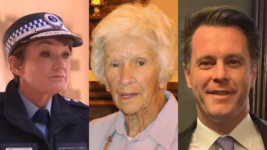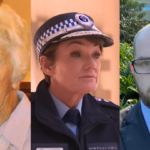Parliament Finds Policing Mental Health Crises Is Deadly, But Major Parties Resist Reform

A carer recently explained in a submission to the NSW mental health access parliamentary inquiry, that on calling NSW police to a crises her mental health patient was having, eight officers arrived, who appeared to have no understanding of such episodes and treated the man like a criminal.
During a standoff in Taree in July 2019, which ended with tactical police fatally shooting Todd McKenzie, regular local officers, who knew of his mental illness, were taunting the man hauled up in his house, calling him a useless drain on society, and challenging him to come out for a fight.
The issue with cops policing mental health crises is nothing new. It’s been around as long as NSW police, since 1862, and it rises to the surface after a killing, as happened in May 2023, when an officer fatally tasered a 95-year-old woman holding a knife and approaching using a walking frame.
Indeed, the last 12 months have been a bumper year for police killing civilians having mental health crises, with the death toll at five last January. And as the carer highlighted, the issue is whether officers who deal with criminals, often with the use of force, should be first responders at crises.
And when the NSW parliamentary inquiry into mental health access began last September, this was a key issue on its agenda. And with the release of the inquiry’s final report this week, it would appear that the evidence assessed by the committee members suggests an alternative is needed.
Shooting to kill
A report released by the Law Enforcement Conduct Commission in May 2023 on NSW police investigations into critical incidents, or those involving death or injury, found that of the 157 such incidents over the 5 years to June 2022, 43 percent, or 68, of them involved mental health episodes.
Chaired by NSW Greens MLC Dr Amanda Cohn, the inquiry identified a number of issues relating to law enforcement policing of mental health crises, including the “escalation of a situation due to prior negative interactions with police” and “inadvertently criminalising mental-health related issues”.
From the 165 submissions made to the inquiry, committee members found that many stakeholders report “both people with lived experience and carers advising that they would avoid calling emergency services in times of crisis for fear of police involvement” due to potential resulting harms.
Another common theme uncovered was that NSW police officers appearing at a mental health crisis is “heavy-handed, and can be extremely threatening”, while those who do show up lack “qualifications, skills or experience”.
Indeed, as one respondent posited it is unreasonable to expect officers trained to police crime to effectively deal with a psychological crisis, while another identified that many parents of adult children with a condition are concerned that police shoot to kill and don’t attempt to deescalate.
Cops don’t want the role
The inquiry also heard from law enforcement officials, who echoed some of the issues raised by civil society.
Police Association of NSW president Mr Kevin Morton told the inquiry that officers aren’t “clinicians”, adding that most of the time officers showing up in uniform “exacerbates” situations. And he described police being used to “prop up a failing health system”.
“What we are saying is that on occasion – and on a lot of occasions – the primary agency should be Health and that sometimes when police are called the mere fact that police are present can escalate the situation,” outlined the association’s strategy and relationships manager Tony Bear.
And the Police Association manager added that even if officers are aware they’re going to be dealing with a mental health issue, they “don’t see mental health when a person is carrying a weapon”. And when it gets to the point that police have to respond, they do so based on their training.
So, officers are being sent to these crises and deadly and harmful outcomes are occurring because officers are acting in a manner they’re expected to act in, and if an issue arises, individual officers are then punished and not those who could implement a mental health focused response.
Alternatives are already operating
The Equity, accessibility and appropriate delivery of outpatient and community mental health care in NSW inquiry further asserted that while an improved mental health system would prevent crises, when an emergency response is called for mental health and peer workers should be responding.
As Cohn told Sydney Criminal Lawyers at the time the inquiry was launched, “There are great examples of alternatives, both in other Australian jurisdictions and overseas, including the Police, Ambulance and Clinical Early Response (PACER) program, which has been trialled already in NSW.”
The Greens MLC added that PACER involved partnering a paramedic, a mental health clinician and a police officer to respond to mental health crises, and they turn up in an unmarked car. And this is already impacting the way crises are approached in the ACT and will soon be in Tasmania.
And the Redfern Legal Centre noted in its submission that while the PACER program is still in its infancy, it’s “producing positive outcomes” for those in need of assistance, as it is “reducing trauma and preventing further physical and psychological harm”.
Recommending more inquiries
The inquiry made 39 recommendations. And those involving the law enforcement approach to such crises include improving mandatory mental health training, that consideration is given to police to being secondary responders to these incidents, as well as consideration of a PACER-type program.
But Cohn, the committee chair, provided a dissenting statement criticising some recommendations made that were watered down. And in terms of the policing situation, she outlined that reform is necessitated, so the major parties’ favoured approach of exploring the options further is redundant.
“Fifty five people experiencing mental health distress died in interactions with NSW police during the past five years,” the doctor explained.
“How many more people will come to harm while the government ‘continues to explore’ the implementation of a health-led response to mental health emergencies?” she asked, and then vowed that “The Greens will not stop advocating for this until it is implemented across NSW”.







